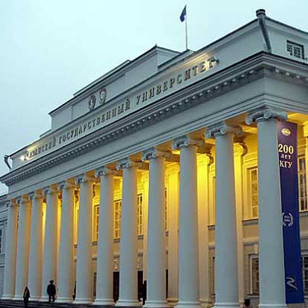Rector's Greeting Kazan Federal University
Kazan University is one of the oldest universities in Russia, it celebrated its 210th anniversary in 2014. We celebrated this date as another token of the university's dedication to its longstanding academic mission as one of the leading educational institutions in Russia and in the world. Kazan University has gained its international fame thanks to its distinguished scholars and graduates whose achievements have had a beneficial effect on the whole mankind. The unique culture of our University has shaped the development of Kazan and the Volga region. The University's new federal status obtained in 2010 poses new interesting challenges and calls for new approaches in the rapidly changing world.
Today Kazan Federal University is a dynamic modern University actively participating in local and international cooperation, networking with academia and industry, boosting the region's human resources development as well as top-level research and innovation in different areas. 17 Centres of excellence and 80 world-class research and teaching laboratories have been established in recent years. Our participation in the "5-100" competitive growth program designates our determination to reach the highest levels of world educational rankings. What we have achieved up to now is an evidence of the right choice of strategy — from a classical to a research university where entrepreneurial and innovative activities are represented prominently. Sincerely Yours Ilshat Gafurov Professox.
Kazan University is a present-day model of a classical university where the most fundamental principle is the synthesis of research and education. Institute is a research and education structural units of the University (Institute), which offers educational programs of higher and post-university professional education, pre-university and additional professional education in a number of neighbouring specialties and directions, and implements fundamental and applied research projects in relevant scientific fields. Institute's structure may include divisions, departments, laboratories, research and training, research and education centres and other main and auxiliary units.
Faculty
Faculty is a research and education structural unit of the University, which offers educational programs of higher and post-university professional education, pre-university and additional professional education in one or several neighbouring directions and specialties and implements fundamental and applied research projects in relevant scientific fields. The faculty consists of departments, laboratories and other units. Faculties are headed by deans direct management of the Institute is carried out by Dean who is elected on a competitive basis by the University Academic Council by secret vote.
Department
Departments are basic structural units of Institutes and Faculties. Departments carry out educational, methodological and scientific-research activity, social-educational and extra-curricular work with students, training and retraining of pedagogical and research staff. Departments are headed by Heads of departments.
Main academic units of the University are:
- Institute of Geology and Petroleum Technologies
- Institute of Fundamental Medicine and Biology
- Institute of Environmental Sciences
- Alexander Butlerov Institute of Chemistry
- Higher School of Information Technologies and Information Systems
- Institute of Engineering
- Institute of Computational Mathematics and Information Technologies
- N.I. Lobachevsky Institute of Mathematics and Mechanics
- Institute of Physics
- Faculty of Law
- Institute of International Relations, History and Oriental Studies
- Leo Tolstoylnstitute of Philology and Intercultural Communication
- Institute of Psychologyand Education
- Institute of Social and Philosophical Sciences and Mass Communications
- Institute of Management, Economics and Finance
- Higher School of Public Administration
- Higher School of Business
- Physical Education and Sports Academic Unit
- Institute of Continuing Education
- Faculty of Advanced Training and Staff Retraining
- Preparatory School for International Students
- The University has two branches in Naberezhnye Chelny and Yelabuga.
Research in KFU
Research in KFU is conducted in the framework of twenty-seven major research directions. About half of them are focused on research in natural sciences, a third is devoted to humanities, and the quarter is interdisciplinary. Research is carried out on the basis of hundred seven departments, fourteen faculties, three institutes, two branches, thirty-three research laboratories, five research and development sectors, two project groups.
RESEARCH & INNOVATION
Currently, the research in the Kazan (Volga region) Federal University is carried out in 250 departments, 17 faculties, 18 institutes, 3 branches, 128 research and educational laboratories and 42 research and academic centres of KFU. In order to improve the quality of education and provide the further integration of education and science in KFU there have established several R&A (Research and Academic) centres with highly-developed instrument base. Amongst them are:
- Quantum optics, laser physics and nanophotonics
- Resonance frequency behaviour of condensed matter
- Extreme problems of complex analysis and mathematical physics
- Biomedical radio spectros copy and optics
- I. A. Baudouin de Courtenay Centre of linguistics
- Regulation of cell response to stress factors
- Centre of proteomic studies
- Quantum Technologies Centre
- RIKEN Centre
GLOBAL COOPERATION
The very foundation of Kazan University was directly linked to international academia. Some of the University's first teachers were German professors such as Johann Bartels, Franz Erdman and Christian Fren. The famous German professor Karl Fuchs, who was both the founder of Kazan Medical School and the first European researcher of Tatar history and culture, became the University's rector in the 1820s and was awarded the title of Honourable Citizen of Kazan. Since that time Kazan University has had one more rector with international background — Professor Ivan Braun (1813-1819) from Austria. Today the University continues enlarging its international dimensions and enhancing its globally renowned
The Campus of university is safe. Students of the university live in comfortable hostels, located in a quite part of the city. The hostels are provided with all the facilities for study and rest.


